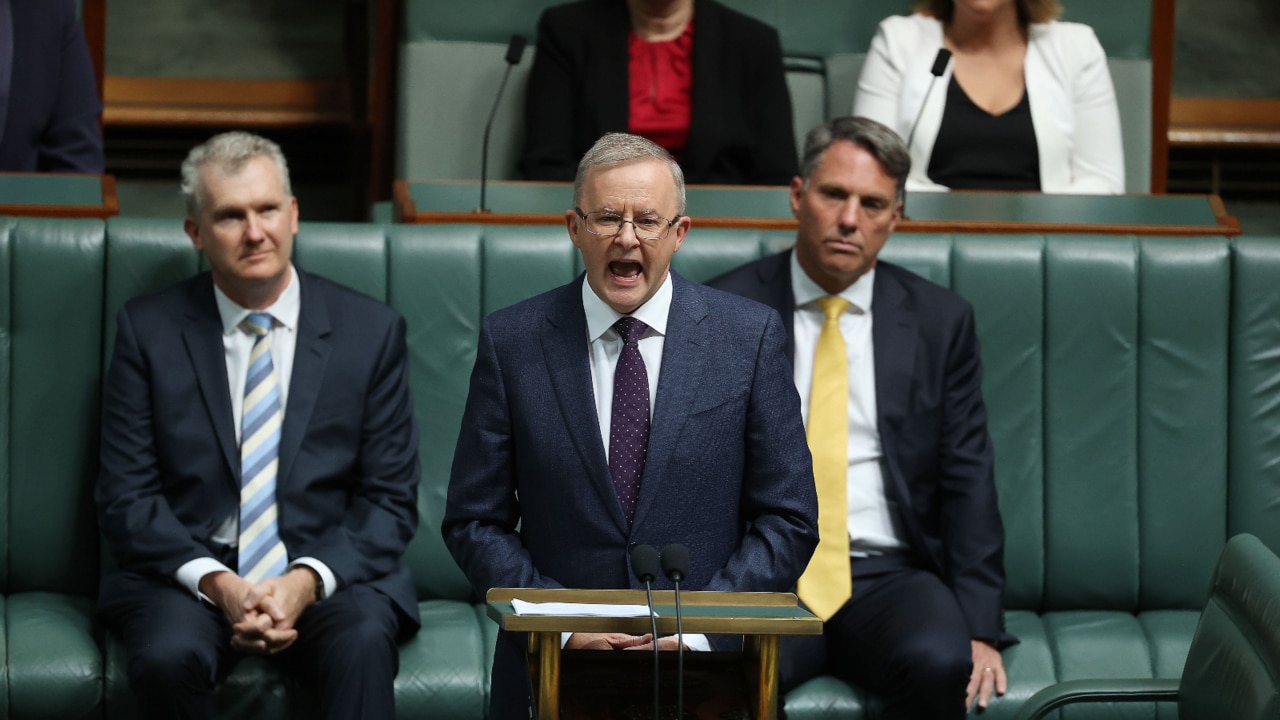Vikki Campion: Anti-social behaviour on the rise with abolition of cashless debit card
The Albanese government does not want to confront the obvious which comes with the release of five reports into the abolition of the cashless debit card, writes Vikki Campion.

Opinion
Don't miss out on the headlines from Opinion. Followed categories will be added to My News.
As the focus was on the biggest constitutional debate in Australia’s history, a dutiful parliamentary attendant pressed publish on five reports Prime Minister Anthony Albanese hoped no one would read.
This trove of pertinent information reveals the truth that nobody wanted to hear when Labor abolished the cashless debit card, which former prime minister Tony Abbott brought in to quarantine 80 per cent of welfare payments on a card that could not be spent on alcohol or gambling.
Then the cash came back, and it was holding hands with addiction, neglected kids and bashed women.
Services Australia data released in a Question on Notice in the Senate, and hardly widely ventilated paints a diary of pain. Beginning in the first week of October 2022, the transition started to remove people from the card, 75 per cent are still on it and in all four regions, Bundaberg-Hervey Bay, Ceduna, East Kimberley and the Goldfields, “nil incidents were raised”.
By the end of October, when 74 per cent of people had been transitioned off the card, it notes a 300 per cent increase in arrests in Ceduna, soaring street drinking and crime in Kalgoorlie.
By mid-November, when 83 per cent had transitioned off the card, “drug or alcohol admissions at Ceduna Hospital had doubled” where the number of admissions for the first two weeks of November 2022 exceeded the entire month of November 2021. In all regions, anti-social behaviour had “magnified”.
By December, when 87 per cent had left the card, service organisations “noted more public alcohol consumption, fighting and violence, and increased use of poker machines and alcohol sales”.
In response, the federal government puts down $2m in ad hoc grants for “needs associated with the CDC transition”.
Come January, Ceduna women needed extra safe houses “due to increased family violence”.
Service providers, whose names are redacted, report increased requests for food relief and increased anti-social behaviour.
The department attributed a rise in the number of intoxicated people and violence in the streets of Kununurra to “extreme weather conditions”.
By February 2023, when 99 per cent have transitioned off the card, service providers report a 60 per cent increase in breakfast club and emergency lunch for kids compared to the year before “due to lack of food availability in the homes”.
By early March, in Bundaberg-Hervey Bay, redacted agencies report “high amounts of emergency relief requests”, and East Kimberley advises high domestic violence and alcohol-related crime.
Services Australia insists in the document that neither the 300 per cent increase in arrests, nor the domestic violence filling women’s refuges, nor the hungry kids, are attributed to CDC cessation. They cannot admit there is a correlation between alcoholism, violence, and crime, as there is a correlation between sobriety and harmony. Why are there fights at the doors of pubs, not at the entrance of coffee shops?
By early March, 12,200 people have transitioned off the card and just 145 remain on Labor’s voluntary version.
Another $49m is spent on “additional alcohol treatment services in all regions that previously had the CDC card”.
This week, after running an election campaign to abolish it, Albanese passed a cashless welfare bill, bringing in Labor’s voluntary version of “enhanced income management”. Around the same time, documents from the Department of Social Services were tabled, revealing communities that had been transitioned from the CDC card would have “place-based” solutions, including “family healing” and “perpetrator behaviour change” programs.
In reviewing CDC communities since the card was removed, Department of Social Services documents said sober-up services at Ceduna were “at capacity”. At the same time, crisis accommodation and women’s refuges desperately needed more room in East Kimberley. Goldfields reported a 50 per cent increase in child protection caseload in the last three months of 2022, noting “elder abuse increased over the same period”.
Service providers reported increased demand for financial counselling and money management services and access to gambling support services.
The deadline for an outcome on all of these problems is not until June next year.
Since the card was dumped, service providers in Bundaberg and Hervey Bay have struggled to support men, women and children experiencing domestic violence.
When Nationals MP Keith Pitt questioned a child’s right to be fed, clothed and protected, the Labor Minister at the helm of the DSS, Amanda Rishworth claimed his “police had not reported an increase in anti-social behaviours”. But these reports reveal domestic violence waitlists in Pitt’s patch were so long that people experiencing family violence were “denied support”. If domestic violence is not anti-social, then what is?
This is emblematic of a country determined to erase the voice of hungry kids in Western Australia for the Canberra clique. Where political correctness absolves them of the obvious solution. Even worse, they had a working solution, and they removed it.
They need a Voice – but they do not need anybody to read these reports. Labor denies quietly tabling the reports, saying they were also released to media in March.





